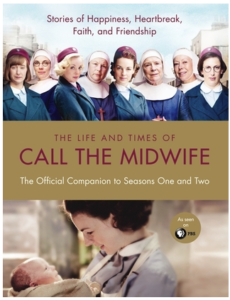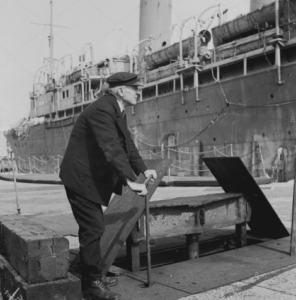
A book that engages readers in a world which they likely would never enter and therefore, never know about.
Call the Midwife
Jennifer Worth

Unique or special people are more common than is thought. Many people can create a notable list of people they regard as special in minutes, and these can be lengthy lists easily. Once one reads ‘Call the Midwife,’ Jennifer Worth, the author of the book, would undoubtedly be added to most people’s list.
Jennifer was born in an English ‘hole in the wall’ town called Clacton-on-Sea in 1935 and until 1945, shared a seemingly happy home with her younger sister, Christine. The idyllic family home was destroyed when Jennifer’s mother discovered the husband’s infidelity. The father was banished from the family home, and the daughters were now raised by a single mother. Jennifer developed into the more independent, unrulier sibling. She was expelled from boarding school proving at an early age that rules were made for others to follow, not her. The independence streak took her into unexpected directions early in her life and endlessly. At 14 she ran away from home to begin life clawing to make a living, to find a career and to survive.
Kicked out of her own home, Jennifer scratched and clawed to find a way to survive. Eventually, she lied her way into a job as a secretary at a public school where she had an affair with the headmaster. The affair never blossomed. Her employment as a school secretary was terminated when she “had a wobble and smacked a student.” Onward along new paths, Jennifer trained as a nurse at the Royal Berkshire Hospital. Nursing became her calling and it led her to knock on the door of what she thought was another London hospital. It was the convent door of the Anglican Nursing Sisters of St John the Divine. Her life changed forever.

Not religious by any stretch of the imagination, the nursing applicant was accepted by the nuns whose primary work in the 1950’s and 1960’s was midwifery among the war-torn slums of Poplar, London. The area was devastated by the German bombing during WWII and no real reconstruction of the borough was ever undertaken. Still, the families of the dockworkers remained in the area. Homes though they may not have been, they did provide shelter and habitable accommodation. It was a slum, an area of destitution and poverty, compounded by illiteracy and social polarization of the Cockney speaking population. It seemed no one care about these people; no public assistance was ever considered by the political authorities. But the Sisters of St. John cared and cared for these people, providing medical care, contact with doctors and hospitals and delivering their offspring. Jennifer entered this world and her heart melded with these people. She did not see them as illiterates, uneducated, poor masses. Instead, her view was that they were a simple folk who were destitute by the luck of the draw, surviving in the worst conditions, finding work in the poorest of employment conditions, the docks of London’s Poplar borough.
The synopsis
Emulating the renowned veterinary, James Herriot when he wrote about pets and their owners — Worth writes about with fewer cows and more Cockneys. Worth sketches a warm, amiable portrait of hands-on medical practice. The author became a midwife at age 22, learning her trade in the 1950s from the nun midwives at the convent of St. Raymund Nonnatus and working among impoverished women in the slums of the London Docklands. Her frank, sometimes graphic memoir describes scores of births, from near-catastrophes to Christmas miracles, and details her burgeoning understanding of the world and the people in it. The book is stocked with charming characters: loopy Sister Monica Joan, the convent’s near-mystic cake-gobbler and mischief-maker; Father Joseph Williamson, the prostitutes of the area and their babies; handyman/poultry salesman/drain cleaner/toffee-apple pusher Frank; and posh Camilla Fortescue-Cholmeley-Browne (“Chummy”), an outrageously warm-hearted debutante who devoted her life to midwifery and missionary work. Worth depicts the rich variety of life in the slums, where loving, doting mothers of nine rubbed elbows with neglectful, broken young women turning tricks to support their husbands’ nightlife. She draws back the veil usually placed over the process of birth, described here as both tribulation and triumph. At birth after birth, as women and midwives laboured to bring babies into the world through hours of pain and occasional danger, Worth marvelled at the mothers’ almost-uniform embrace of their babies. “There must be an inbuilt system of total forgetfulness in a woman,” she writes. “Some chemical or hormone that immediately enters the memory part of the brain after delivery, so that there is absolutely no recall of the agony that has gone before. If this were not so, no woman would ever have a second baby.” A charming tale of deliveries and deliverance. Source Kirkus Reviews, 2009
Richard comments
This book is an engaging and educational tour of the Cockney dockside boroughs of London’s Poplar district. It presents a series of characters, events and snapshots of a portion of post-WWII London where many people would never venture, an area of dark slums, of unsanitary shelters in no one could or should live, of people socially and economically ostracized by other Londoners. And in this environment, the author, Jennifer Worth, worked as a professional nurse, a midwife during the 1950’s and 60’s.

Poverty, destitution and misery
Each chapter of the book is more engaging than the earlier one as the reader is taken deeper and deeper into a society they are never to know or experience in their own lifetimes. A world of destitution, ignorance, illiteracy and incomprehension. A social group as isolated as the poorest of any caste system. Yet, Worth underlines the love, caring and passion that these people had on their own. The suffering is indescribable. The hardship unbelievable. The misery beyond credibility. Worth’s medical ward. Worth, as a training as a midwife and practising the profession dedicated her life to helping and working for the welfare of these people.
History in sight and sound
The novel is a series of historical snapshots with dialogue: snapshots of the environment, the society and the socio-economic culture spiced with pieces of Cockney dialogue spoken by the characters of the particular chapter. The reader views how it was living in the area through sound bites and sight descriptions. It is an entertaining way to see how people lived in this area of London in the decades after WWII.
A real page turner
The book wins over readers with its descriptions of the dire situations, with its crises after crises chronicling, with it linguistic authenticity of a language as incomprehensible as Greek would be to most people. Readers are progressively drawn deeper and deeper into a tumultuous world of poverty and misery. However, the book becomes a page-turner as Worth describes how the world is one of endurance and survival, how the mothers who have given birth seem to rise to the demands required of them to save their children. The book describes human tragedy and how people climb to surprising heights in their efforts at becoming survivors, not just themselves, but their children too.
Survival of the ablest
The endurance and survival of these people will draw a reader to turn page after page to see what happens next and gratefully, Worth avoids recounting the inevitable number of stories of failure, of surrender and of gloom which must have been a great part of this story. Instead, Worth concentrates on the positive, on the constructive stories with the better endings.

The book is a description of an impoverished area of London in the decades after WWII. It describes a people who are the castaways of London and of England at a time when English society was recovering the punishment and destruction of the war years. The people of this story were excluded from the recovery but they never surrendered, never gave up. Somehow, they retained the capacity to laugh, to find the humour in devastation, to care for and about other and to love one another. The book recants that story, with feeling and care.
In short
‘Call the Midwife’ is more than worth reading. It is ‘humanity-survives’ ‘de rigueur’ reading.
An excellent read.





